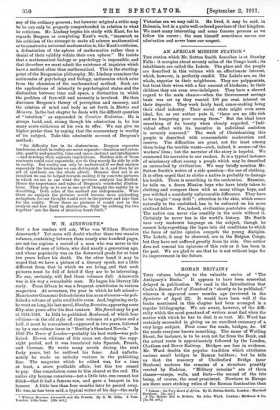W. H. ArNSWORTH.*
NOT a few readers will ask, Who was William Harrison Ainsworth P Yet more will doubt whether these two massive volumes, containing between them nearly nine hundred pages, are not too copious a record of a man who was never in the first class of men of letters, who died nearly a generation ago, and whose popularity was on the downward grade for at least ten years before his death. On the other hand it may be urged that we have a picture of a literary epoch, not a little different from that in which we are living, and that such pictures must be full of detail if they are to be interesting. No one, certainly, will find these volumes dull. Ainsworth was in his way a remarkable man. He began his literary life early. From fifteen he was a frequent contributor to various magazines. At seventeen, the year in which he left school— Mane hester Grammar School claims him as an alumnus—he pub- lished a volume of quite creditable verse. And, beginning early, be went on long, his last novel, Stanley Brevet on, appearing some fifty-nine years after his first venture. His floruit may be put at 1834-1840. In 1834 be published Rookwood, of which four editions—in the old style of three volumes at a guinea and a half, it must be remembered—appeared in two years, followed up by a one-volume issue in "Bentley's Standard Novels." In 1840 The Tower of London—probably his best work—was pub- lished. Eleven editions of this came out during the copy- right period, and it was translated into Spanish, French, and German. He wrote many novels during the next forty years, but he outlived his fame. And unfortu- nately he made an unlucky venture in the publishing line. The magazine which he edited was, for a time at least, a more profitable affair, but this too ceased to pay. One consolation came to him almost at the end. His native city became conscious—not a little late, one cannot but think—that it had a famous son, and gave a banquet in his honour. A little less than four months later he passed away. He was, as has been said, a typical writer of his day—the early • Witliarn Harrison Ainsworth and His Friends. By S. H. Ellis. 2 Vols. London: John Lane. [32s. net.]
Victorian era we may call it. He lived, it may be said, in Bohemia, but in a quite well-ordered province of that kingdom. We meet many interesting and some famous persons as we follow his career ; the man himself sometimes moves our admiration and never loses our respect.






































 Previous page
Previous page